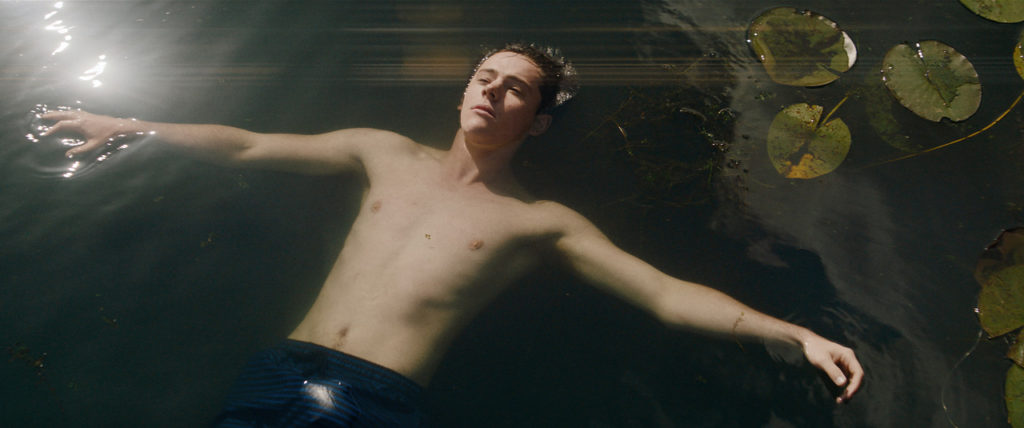Philophobia (2019)
Unrated
Deep longing permeates nearly ever scene of Guy Davies’ new film Philophobia. And why wouldn’t it? The drama details the coming-of-age of an assortment of teenagers in a small town in the English countryside. It’s well-trodden material that we expect to veer into either sex comedy, feel-good love tale or unexpected tragedy. We get a bit of all of that, but Davies’ velvet-hammer touch amplifies a raw, naturalistic depiction of withering adolescence; well-rounded, stirring performances further elevate the proceedings.
As the school year wanes, we follow several kids awaiting summer. Some, more than others, are ripe to escape not just the school year, but the provincial, listless town that’s squeezing the life out of them.
 Kai (Joshua Glenister) certainly seems to have a bright future. He’s a writer with burgeoning talent, despite his fears of pushing through his insecurities. Kai hangs with and gets high with Sammy and Megsy. Sammy (Charlie Frances) drives a milk truck and initially seems to balance his dreams and reality. Megsy (Jack Gouldbourne) is the stereotypical foulmouthed, loud-speaking, trouble-seeker who seems to exist to constantly plunge his friends into unnecessary situations. It’s a testament to Gouldbourne’s performance that Megsy ultimately escapes the archetype foisted upon him.
Kai (Joshua Glenister) certainly seems to have a bright future. He’s a writer with burgeoning talent, despite his fears of pushing through his insecurities. Kai hangs with and gets high with Sammy and Megsy. Sammy (Charlie Frances) drives a milk truck and initially seems to balance his dreams and reality. Megsy (Jack Gouldbourne) is the stereotypical foulmouthed, loud-speaking, trouble-seeker who seems to exist to constantly plunge his friends into unnecessary situations. It’s a testament to Gouldbourne’s performance that Megsy ultimately escapes the archetype foisted upon him.
The boys make up the heart of the film. There’s not a misstep in their performances. It’s interesting that each of the boys is being raised by single mothers. There are adult male influences—good and bad—to be found, including a fed-up policeman and a writing teacher who practices tough love with Kai.
The three main protagonists plug into a wider group of peers who are strategizing their senior prank. Despite various characters moving in and out of scenes, Davies connects us to them (and to a broader sense of longing youths) with strong dialogue and by resisting pushing them beyond their unfocused immature existences.
Into the mix tumbles Grace (Kim Spearman), a beautiful, pensive, mysterious girl who lives directly across the street from Kai. Of course he peeks at her through her window as she undresses. But it’s not simply lust. For quite some time Kai has loved Grace from a distance. She’s smart enough to be aware of his desire and talents, and insecure enough to be entangled in a relationship with the monstrous Kenner. Older, bigger, braver and crueler than the high schoolers around him, Kenner tears through the film like a bull in a teashop, leaving most scenes full of broken china by the time he’s done. Alexander Lincoln plays him with virtually no outward redeeming qualities. His relationship with Grace is one of dominance; with the boys one of neck-stomping Alpha-male humiliation. There’s some sad, distant longing within him, but Kenner’s not going to let us anywhere near it.
One other character is a stag. The majestic creature, usually only seen by Kai, shows up fleetingly at key junctures. I didn’t completely buy the intent of the stag; it seemed more a setup for a late scene of tragedy than providing any real connective tissue to the post-adolescence milieu so well constructed.
Otherwise, the film takes the characters through their paces—there’s a love triangle; a sociopath about to boil over; a make-or-break final exam; a school prank that’s constantly in flux; and a reckoning to grow up for each of the protagonists. We observe the youths at house parties, packed around lunch tables, scattered in classrooms; hiding out on rooftops, frolicking at the lake. All the while, the dialogue and performances pull us to invest in these gatherings. Davies has an ear for dialogue. I especially liked Kai’s moments of poetic voiceovers that speak not only to his worldview, but his knack for spinning words. His speaks to an inner boy who knows there’s a world waiting for the man he will soon become … if he can hold things together long enough to make it out of his town. He carries a dictionary with words underlined and his own notes scribbled in the margins.
Suspense comes in the form of afternoon getaway in which Megsy’s goaded into bringing along his deceased brother’s rifle, and when a senior prank seems to take a dark turn. Davies allows each scene to defy expectations by tweaking them with humor. The Kai-Grace love story is complex in the subtext of abuse, abandonment and self-loathing, but affecting in the outward attempts of the lovers to connect. We see possible redemptions for each of them in their coupling. Spearman and Glenister are excellent in all scenes together. We get a couple of dark turns in the finale I suppose we should have seen coming, but that ultimately reaffirms love and friendship.
We consider one of Kai words “philophobia,” the fear of falling in love. Late in the film we realize especially Kai and Grace, but most of the character, are locked in place by fear. The film seems to speak to the specific period of our youth when we confront and/or retreat from encroaching adulthood, knowing—as all teens do—that a better life awaits outside of our familiar spaces. If only we can summon the means to take the plunge.

| Marvin Brown’s Movie Review Archive
Social tagging: bloghouse > Charlie Frances > coming-of-age > film review > Guy Davies > Jack Gouldbourne > Joshua Glenister > Kim Spearman > love story > review





